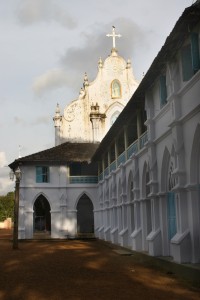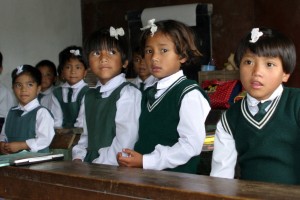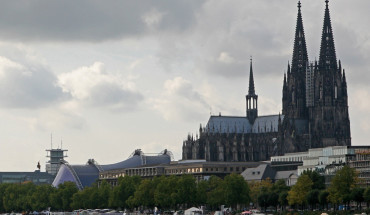(Previously published article)
Our escort, Father James, stops the car. A tribal man with a machete in his hand rushes the car, his face pressed at our window, screaming in his native Khasi language. There is a lump in my stomach. God, what am I doing here?
Traveling to India was not a pilgrimage; nor was it a desire to “find myself,” though India is often touted as a place to do that. It was an answer to a call. The dictionary defines called as a summons or a demand to be present, to give a command for, or an order, to bring your attention to.
I shout, “What’s happening”?
Father James opens his window a crack, the man is pointing and shouting. Father yells back, insistently, shoving some money out the window and we drive on.
As we pass, I see a huge tree blocking the road. A group of local men with machetes hack at its trunk. The man at the car window had been explaining that a storm had knocked over a tree and he was requesting 30 rupees (less than a dollar) to split with the others for the service of removing the trunk and allowing traffic to pass once more. Father James had given him 50 rupees and was arguing with him to please keep the change!
My journey to India, I am coming to understand, will cause me to step back and see the big picture.
We are nearing the end of a three-hour car ride from Guwahati to our destination, Shillong – the capital city of the northeastern Indian state of Meghalaya. It is here with the Salesians that I spent a month “being present,” traveling with my sister in northeast India.
For years I have heard stories from the pulpit of this place and these people, told by our hosts, the Salesians of Don Bosco (an order begun by St John Bosco). It is these priests who opened my heart to this wonderful country and the people they serve.
At 5000 feet, Shillong offers us relief from the heat and humidity of Guwahati. The hillsides are lush with banana trees and pineapple plants. Waterfalls cascade from mountaintops and streams meander through the brush. The storm has quieted, leaving a light mist on the windshield as we approach a bridge spanning Lake Umiam.
Father James tells us that Umiam is known as “the weeping lake.” Legend has it that two sisters were supposed to take a long journey and meet here, but one did not make it. The other sat and wept for her lost sister; her tears collected and formed the lake. Father George, our other escort, muses that if the drought doesn’t lift, one of us could fill it with our tears!
As we make our way into the center of Shillong, the two priests point out where they went to school and reminisced about their teachers and rectors. We stop at a Salesian house to visit a priest who is celebrating his 90th birthday.
We are introduced to several other priests, and all introductions are followed by what year they completed seminary, much like we refer to a sibling and how many years apart we are. All of them are connected like a family of brothers.
Our days begin and end much the same, with the Salesian community at Saint Anthony’s College. We awake for morning Mass, have breakfast and tea together. We depart to visit an orphanage, school or seminary, have tea and “wash” (an all-inclusive term that includes anything from washing your hands, to using the toilet, to bathing. And all of those things involve a bucket!).
We are greeted always by the community with songs telling us how glad they are to welcome us.
One afternoon as my sister and I listened to a group of priests speak about their life and their fond memories of each other, I ask them, “So you have lived here since you were 12?” A fact I knew, but was really just beginning to understand.
“Yes, in and around this area,” one of them said. “It has been a life of total sacrifice.”
Most of the priests in India come from the southern state of Kerela, which is 20 percent Christian, of which 80 percent are Catholic.
Our last two days in Shillong are spent at a rural training center run by the Salesian priests. Here they teach substantive farming techniques to tribals, most of whom grow rice and have a cow. The priests teach them how to grow produce such as mushrooms that provide an income as well as food.
After washing and having yet another cup of tea, we spend the evening enjoying the tribal teens who have come from the neighboring state of Assam for a month-long training course. Their English is very limited and our Khasi consists of “Khublei” –a general salutation.
Our communication is further hampered by a lack of personal space. A couple of the girls have their arms wrapped around our waists. Staring and trying to form an English sentence they ask my blonde haired, blue eyed, five-foot ten-inch sister, “Why is your hair white?” Putting their finger to her nose, they add, “Why is your nose so far from your face?”
Rarely do we have anyone ask us who we are in such simple terms – “Why are your feet so big?” And in our world of GPS-equipped SUV’s rarely do we notice how lost we have become.
Upon my return, my girlfriend mused, “So did you find yourself?” And one year later I can answer, cliché though it is, yes I did find myself in India. My feet are too big and my nose is so far from my face, but I am a beloved child of God. And that is the truth he wanted me to see!







